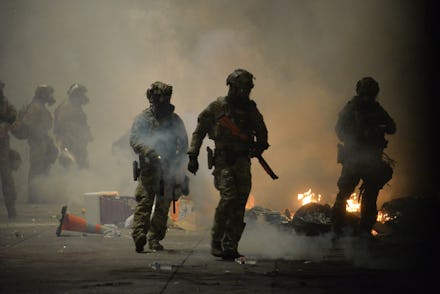Portland just banned the use of tear gas by cops

Portland Mayor Ted Wheeler (D) announced Thursday that he had directed the Oregon city's police department to end its use of tear gas, marking a potential turning point in the ongoing protests that have made Portland one of the epicenters of the social justice uprising that has roiled the country since this spring.
"We all have the opportunity and obligation to create change," Wheeler explained in a press release introducing the policy shift. "We all want to focus on the fundamental issue at hand — justice for Black people and all people of color."
"That’s why, as police commissioner, effective immediately and until further notice, I am directing the Portland Police to end the use of CS gas for crowd control," he continued. Portland's municipal governance structure has traditionally allowed for mayors to keep the policing portfolio for themselves as part of the city council's day-to-day operation of various local bureaus.
"During the last hundred days Portland, Multnomah County and State Police have all relied on CS gas where there is a threat to life safety," Wheeler said. "We need something different. We need it now."
Wheeler's announcement comes just days after police arrested more than 50 people on the 100th night of consecutive protests in the city, during which tear gas was deployed against demonstrators, as it has regularly been over the past several months. Wheeler had previously ordered police to refrain from using tear gas "unless there is a serious and immediate threat to life safety, and there is no other viable alternative for dispersal."
The mayor's handling of the ongoing protests in Portland, including his decision to continue serving as police commissioner despite pressure from other city leaders, has been complicated by President Trump's deployment of federal troops to the city who have, themselves, attempted to quell the growing demonstrations there using chemical irritants like tear gas. In late July, federal agents used tear gas on protesters, including Wheeler himself, who later told Oregon Public Broadcasting that "it was not great."
While federal officials agreed to withdraw their forces from Portland in late July, their presence in and around the protests has still been felt — most recently this past week, when U.S Marshals shot and killed Michael Forest Reinoehl in Washington State, after Reinoehl was accused of shooting a right wing militia member during an earlier demonstration in Portland in late August.
Protesters in Portland have claimed that prolonged exposure to tear gas resulted in a series of health issues, including disrupting menstrual cycles and other hormonal complications.
"There’s really no data on this," Duke University School of Medicine professor Sven Eric Jordt told OPB. "It’s entirely possible that some of these chemicals that if you inhale them at high levels can have effects. But it’s really hard to say." Although tear gas has been banned for use in warfare, law enforcement has still been allowed to use it in certain domestic circumstances under the Chemical Weapons Convention signed in the early 1990s.
The American Civil Liberties Union's Oregon chapter hailed Wheeler's decision, writing that "tear gas is cruel, dangerous, indiscriminate, and has been used to try to silence people who are protesting for racial justice."
"It should never have been used," the group concluded.